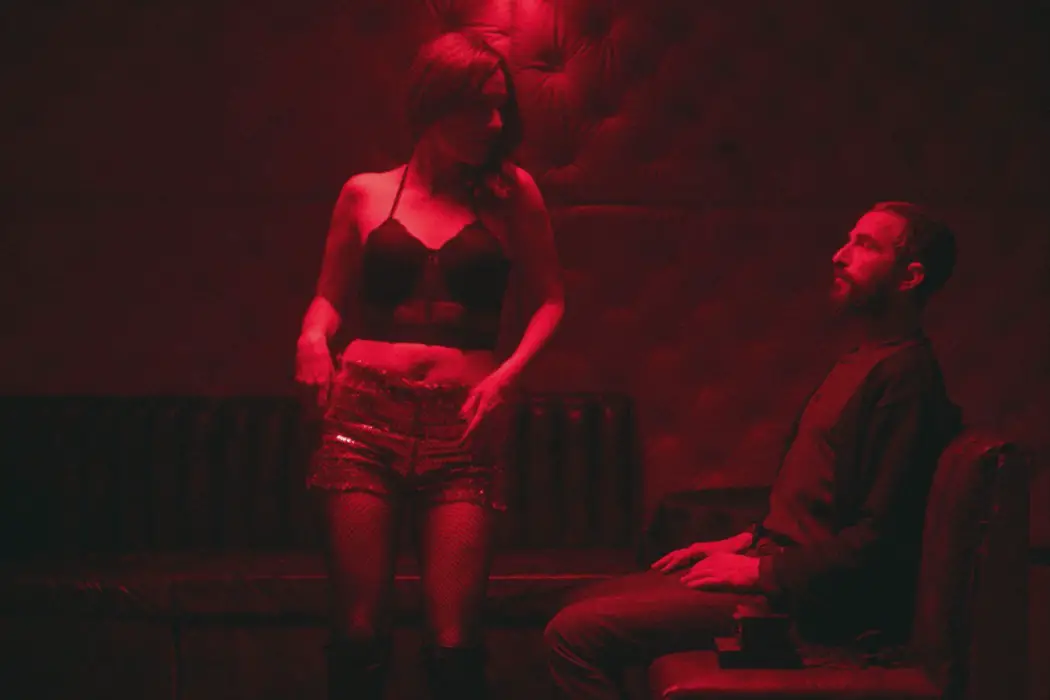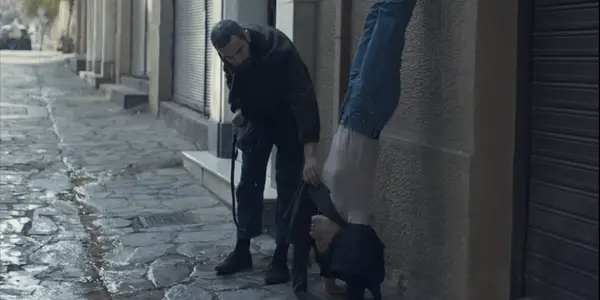APPLES: A Dry And Colorless Dark Comedy

Soham Gadre is a writer/filmmaker in the Washington D.C. area.…
Sometime around the late 2000s into the 2010s, there was a large string of American indie films, most of which premiered at Sundance and got picked up by one of the few “indie subsidiaries” of major Hollywood studios — Fox Searchlight, Focus Features, Paramount Vantage, Sony Pictures Classics, etc. — that combined a gratingly twee style of romance with awkward comedy. Some titles that automatically come to mind are Mike Mills’ Thumbsucker, Goran Dukic’s Wristcutters: A Love Story, and Max Mayer’s Adam. Around the same time that this trend of cinema started to die down, what is now known as the “Greek Weird Wave” started to rise up. Informally kicked off by the sensation of Yorgos Lanthimos’ subversive black comedy Dogtooth, this movement took awkwardness to a maximalist extension and turned romance, defined by strange human ritual, to its most twisted extremes. Somehow, though, this original, exciting form of cinema horseshoed back into the dull and coy American indie style with Christos Nikou’s Apples.
Pretty Forgetful
A muted version of the romantic absurdities of Lanthimos’ incredible The Lobster, Nikou’s Apples turns romance into a chance meet-cute encounter of two people, Aris (Aris Servetalis) and Anna (Sofia Georgovassili), who both suffer from amnesia and are both kept in monitored boarding homes as part of a medical program to diagnose and cure their illness. This illness is a pandemic in the film, as many are starting to forget things at a rapid rate.

The film concentrates mostly on Aris, who is a quiet, shy, and oftentimes aloof individual (because of this condition) who really likes eating apples. The apples serve as a metaphor for holding onto the past; the only thing Aris remembers is that he likes the taste of them – sort of like how the only thing Leonard Shelby remembers in Memento is the murder of his wife, but more… quirky.
Too Subtle And Vague
Also, like Shelby, Aris takes pictures of everything he comes across that he feels like he wants to remember. Unlike the central mystery of Christopher Nolan’s film, where revenge is the key motivator, memory is defined more abstractly here. Aris wants to remember things because he thinks something is beautiful and simply worth remembering.

Servetalis’ unassuming performance treads a thin line between blank subtlety and just not having much to do. His mannequin-like existence is lacking in inertia, just like the narrative. On the other hand, Georgovassili offers the only sense of liveliness in the movie. Her character acts as a counter to Aris’ stoicism, but even she’s not enough to give the movie the burst it needs. There are definite inklings of insight into the loss of memory not deterring natural and instinctual feelings – like taste, attraction, grief, and love – that makes Apples sweet with ideas. But these ideas are hardly grown or developed in a movie that’s too concerned with being subtle and vague, sheepish in its humor as well as its emotions.
Conclusion
The overall canvas matches the vagueness and is frustratingly opaque in style. It uses a nice 1.33:1 aspect ratio wherein its characters stand, sit, and march around like figurines. The behaviors of these individuals are quiet and stately, hardly anything beyond direct information is relayed, and much of the film plays off its lead pair’s twee awkwardness that seems charming at first but remains shallow in any of its romantic or emotional dimensions. One can look at Nikou’s Greek Weird Wave brother, Lanthimos’ The Lobster, to see the ways in which relationship dynamics, attraction, and the weirdness of ritual play with such mischievousness and genuine verve. Apples tries to remain as coy as possible, and the result is rather flat.
Have you seen Apples? What did you think? Let us know in the comments below!
Apples is set to release in select U.S. theaters on June 24th, 2022.
Watch Apples
Does content like this matter to you?
Become a Member and support film journalism. Unlock access to all of Film Inquiry`s great articles. Join a community of like-minded readers who are passionate about cinema - get access to our private members Network, give back to independent filmmakers, and more.
Soham Gadre is a writer/filmmaker in the Washington D.C. area. He has written for Hyperallergic, MUBI Notebook, Popula, Vague Visages, and Bustle among others. He also works full-time for an environmental non-profit and is a screener for the Environmental Film Festival. Outside of film, he is a Chicago Bulls fan and frequenter of gastropubs.













